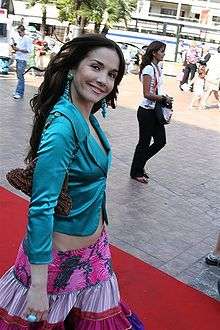Natalia Oreiro
Natalia Marisa Oreiro Iglesias (Spanish pronunciation: [naˈtalja oˈɾejɾo]; born 19 May 1977) is a Uruguayan singer, actress, and fashion designer. Oreiro began her career in telenovelas. Since 2008 she has switched to work primarily in films. Oreiro has worked on social awareness shows and events for organizations like Greenpeace and UNICEF, the latter of which designated her as ambassador for Argentina and Uruguay in September 2011. She has been included in Esquire magazine's "The Sexiest Woman Alive Atlas" list.[1]
Natalia Oreiro | |
|---|---|
_07_(cropped).jpg) Oreiro in 2018 | |
| Background information | |
| Born | 19 May 1977 |
| Origin | Montevideo, Uruguay |
| Genres | Latin pop, rock |
| Occupation(s) | Singer, songwriter, actress, model |
| Instruments | Vocals, guitar |
| Years active | 1990s–present |
| Labels | BMG – Ariola |
| Website | NataliaOreiro.com |
Life and career
1977–2000: Early life and career beginnings
Natalia Oreiro, daughter of Carlos Florencio Oreiro Poggio and Mabel Cristina Iglesias Bourié, was born on 19 May 1977. Natalia studied drama at the age of eight and at twelve started auditioning for advertisements. During her teens she appeared in more than 30 television commercials for such trade marks as Coca-Cola, Pepsi and Johnson & Johnson. At the age of 16 she moved to Argentina to work there and unleash her ambition to be a star. She worked as an MTV VJ and in 1995, she landed a role in the soap opera Dulce Ana. She was then cast in the TV series 90-60-90 modelos (1996) and next in Ricos y famosos (1997, playing Valeria). Next, she starred in the Argentinian film Un Argentino en New York (1998). After the movie, Natalia launched her first album, Natalia Oreiro and the single "Cambio Dolor" became the opening theme for her next acting project, the prime time show Muñeca brava (1998–1999). For her performance in Muñeca Brava, Natalia was nominated twice (1998 and 1999) for a Martín Fierro Award as best actress in a leading role. In 1998, Natalia Oreiro recorded the theme "Paths of the Soul" next to Kennedy Choir[2] and with more than 120 Argentine artists under the direction of Instrumental pianist and conductor Nazareno Andorno.
In January 2000, Natalia was named "Celebrity of the Century" by E! Entertainment Television. She became popular in Russia and Israel due to the success of Muñeca Brava in that country and was even invited to star in a Russian telenovela. In Israel she performed many times on big stages and on many TV shows and won the best telenovela actress award and best theme song "Cambio Dolor" on "VIVA 2000" awards, And in 2002 the Israeli Cable TV had a live competition for finding the Israeli Natalia Oreiro, and she was the honor guest of the evening.
2000–2005: Tu Veneno and Turmalina
She pursued her musical career with the next album Tu Veneno and presentations in Gala de la Hispanidad, Gala de Murcia (both in Spain) and Festival de la Calle 8 in Miami. Her most important appearance was in the prestigious Latin television show Sábado Gigante Internacional, hosted by Don Francisco. Natalia's major achievement at this time was her music performance in Chile at Viña del Mar Festival 2000 for which she was crowned Queen of that event.[2] The album scored a Latin Grammy nomination for Best Female Pop Vocal Album, but lost to Christina Aguilera's Mi Reflejo.

On 1 June 2002, her third studio album Turmalina was released by BMG Ariola Argentina. Turmalina was produced by Latin record producer Kike Santander and is a combination of rhythms such as rock, pop and some sort of reminiscent of the 60's and 50's sounds. On this album, Oreiro write and composed the songs: "Alas De Libertad" which is inspired by kids she met some time ago in the city of Jujuy, Argentina; "Mar" tells the love story between a sailor and his girlfriend. Natalia also contributed to the lyrics of "Cayendo". "Que Digan Lo Que Quieran" is Turmalina's first single. Official Uruguayan 2002 World Cup song "Pasión Celeste" is recorded with Fredy Bessio.[3] "Cuesta arriba, cuesta abajo" was opening song of soap opera Kachorra (Runaway Lady). Kachorra ended with a rating lower than 20 points in Argentina.[4]
In March 2003 she started filming her second film Cleopatra together with Norma Aleandro, Leonardo Sbaraglia and Héctor Alterio, under the direction of Eduardo Mignogna, a co-production with Spain. In the middle of 2003, she started a tour for Eastern Europe and Latin America. On 1 March 2004 she started filming El Deseo.
2006–2014: Sos mi vida, switch to cinema and other works
In 2006 she joined as the female boxer, Esperanza Munoz, the cast of the telenovela Sos mi vida along with her Muñeca brava co-star Facundo Arana. It was directed by Rodolfo Antúnez and Jorge Bechara and broadcast by Canal 13. It began broadcasting on 16 January 2006 and ended 9 January 2007. During its broadcast averaged 26.9 points overall rating,[5] and ended as the most watched Argentine television fiction ever,[6] until it was displaced by the 2009, telenovela Valientes.[7] It was written by Ernesto Korovsky and Sebastian Parrotta, and won four Martín Fierro Awards and three Clarín Awards.
On 30 April 2008, Oreiro starred in Amanda O which was a series of internet television in Argentina and produced by Dori Media Group. It was the first soap opera ever made for the internet,[8] and was seen by 550,000 users over Novebox.com, from Argentina, Uruguay and Paraguay during its first season and beginning of the second.[9] Later in 2008 she co-starred in the film Las vidas posibles, along with Germán Palacios and Ana Celentano and got nominated for a Silver Condor for best Supporting Actress.[10]
In 2009 she starred with Diego Peretti in Música en espera. The film premiered in Buenos Aires in March 2009 and sold 235,000 tickets. During the same year, she visited several international film festivals to present the film Francia directed by Adrián Caetano, including San Sebastian Film Festival among others.[11]
In 2010 she starred in the film Miss Tacuarembó,[12] a musical comedy, which was co-produced by Uruguay, Argentina and Spain. For her performance, she received the Iris award for the best actress.[13] Oreiro also participated in the soundtrack of the film, performing all the songs.[14] During the same year, she presented Se dice de mí, a program that sought to raise awareness about women's rights.
During the first half of 2011, he starred with Daniel Hendler in My First Wedding, a film comedy directed by Ariel Winograd.[15]
In 2012 she started in Lynch, a series created in Colombia and broadcast throughout Latin America.[16] The same year the film Clandestine Childhood, that takes place during Argentina's last military dictatorship, premiered in Argentina. The film was selected to compete for a nomination in the best foreign film category at the 2013 Oscar awards.[17] For her work in this film Oreiro won the Silver Condor award and the Argentine Academy of Cinematography Arts and Sciences Award for the best actress.[18] At the end of 2012 she returned on stage and performed in Superdiscoteca of the 90s Festival, which took place in St. Petersburg, Russia.[19]
During 2013, she starred in the telenovela Solamente vos, which marked her return to television after a 7-year break. For her performance in the series she won awards for the best comedy actress in Tato Awards and Martín Fierro awards. Her next leading role was in the film The German Doctor, which was shot during 2012 in the city of Bariloche, and premiered in September 2013.[20] This film, became the second in Oreiro's career to be shortlisted by the Academy of Arts and Sciences Cinematographic of Argentina to compete for a nomination in the Oscar Awards at the category best foreign film.[21] She also won awards and nominations for best actress in the Condor de Plata awards, Sur awards, and the Unasur Festival.The film was nominated for Goya award and presented at several international film festivals.

2014–present: Nasha Natasha tour, Entre caníbales and I'm Gilda
At the end of 2013 she resumed her musical career performing a tour in Eastern Europe called Nasha Natasha Tour Hits (lit. Our Natasha in the Russian, from the Russian diminutive form of Natalia). She also released a new song and video clip, a cover of Gloria Trevi's song "Todos me miraran". With the "Nasha Natasha Tour 2014 ", she toured a total of 19 Russian cities making a total of 34 shows.[22] One of the most important was the one he held at the Olympic Sports Hall in Moscow, which broke a record, as it gathered more than 60 thousand people.[23] She later recorded a new Russian version of "Me muero de amor" («Я умираю от любви»), with a video clip that starred Facundo Arana.[24]
In 2015 she returned to television starring in the dramatic series Entre caníbales, along with Benjamín Vicuña and Joaquín Furriel, and under the direction of Juan José Campanella. The series was broadcast by the Telefe network for Argentina, and by Fox Life for the rest Latin American market.[25]
In 2016 she starred in I'm Gilda, a film based on the life of the Argentinian singer, Gilda, who died in a car accident in September 1996.[26] The soundtrack of the film became the fourth album in her musical career. In December 2016 she presented the first single of the album, the song Corazón Valiente in collaboration with Ruben Rada.[27]
Discography
- Natalia Oreiro (1998)
- Tu Veneno (2000)
- Turmalina (2002)
- Gilda, no me arrepiento de este amor (2016)
Tours
| Year | Name | Number of concerts |
|---|---|---|
| 2000–2002 | Tu veneno Tour | 35 concerts |
| 2003 | Tourmalina 2003 | 10 concerts |
| 2005 | Tahití, Haití Tour 2005 | 3 concerts |
| 2012 | Festival Super Discoteca de los 90', San Petersburgo, Rusia | 1 concert |
| 2013 | Tour Hits 2013 | 4 concerts |
| 2014 | Festival Super Discoteca de los 90', Moscú, Rusia | 1 concert |
| 2014 | Nasha Natasha Tour 2014 | 16 concerts |
| 2015 | Festival Super Discoteca de los 90', San Petersburgo, Rusia | 1 concert |
| 2016 | Festival Super Discoteca de los 90', Olimpiysky, Rusia | 1 concert |
| 2016–2017 | Cumbia & Hits Tour | 10 concerts |
| 2017 | Parque Camet (Mar del Plata), Festival de Peñas de Villa María, Carnaval de Lincoln, Fiesta Plop, Fiesta del Mate (San José) | 5 concerts |
| 2020 | 20 Years Together | 13 concerts |
Artistic career
Television
| Año | Title | Role | Channel | Notes[28] |
|---|---|---|---|---|
| 1994 | Inconquistable corazón | Victoria | Canal 9 | |
| 1995 | Dulce Ana | Verónica Iturbe Montalbán | Canal 9 | |
| 1996 | 90-60-90 modelos | Lucía Peralta | Canal 9 | |
| 1997 | Ricos y famosos | Valeria García Méndez de Salerno | Canal 9 | |
| 1998–1999 | Muñeca Brava | Milagros 'Mili' Esposito-Di Carlo de Miranda (Cholito/Carlitos) | Telefe |
|
| 2002 | Kachorra | Antonia Guerrero (Kachorra), alias Rosario Achával | Telefe |
|
| 2004 | El Deseo | Carmen | Telefe | |
| 2005 | Botines | Renée | Canal 13 | in "Bailarina en rosa y verde" episode |
| 2006 | Sos mi vida | Esperanza "La Monita" Muñoz | Canal 13 |
|
| 2007 | Patito feo | Patricia González | Canal 13 | Guest appearance |
| 2008 | Amanda O | Amanda O | on internet and América Televisión |
|
| 2008 | Recurso Natural | Canal 7 | Host | |
| 2010 | Se dice de mi | Canal Encuentro | Host | |
| 2011 | Cuando me sonreís | Leonora Bellami | Telefe | Guest appearance |
| 2012–2013 | Lynch | Isabel Reyes alias Mariana | Moviecity | |
| 2013 | Solamente Vos | Aurora Andrés | Canal 13 |
|
| 2015 | Entre caníbales | Ángeles Pellegrini/Ariana Mendoza | Telefe | |
| 2020 | Got Talent Uruguay | Canal 10 | Host |
Filmography

| Year | Film | Role | Notes[28] |
|---|---|---|---|
| 1998 | Un Argentino en New York | Verónica 'Vero' De Ricci | |
| 2003 | Cleopatra | Sandra / Milagros | |
| 2004 | La guerra de los gimnasios (short) | telenovela actress | |
| 2006 | La peli | Lola Montero |
|
| 2008 | Las vidas posibles | Marcía Miconi |
|
| 2008 | Música en espera | Paula Otero |
|
| 2010 | Francia | Cristina | |
| 2010 | Miss Tacuarembó | Natalia "Cristal" / Cándida López |
|
| 2011 | My First Wedding | Leonora Bellami | |
| 2011 | Clandestine Childhood | Cristina |
|
| 2013 | The German Doctor | Eva |
|
| 2016 | Nasha Natasha (Наша Наташа) | Herself | Documentary biographic film |
| 2016 | I'm Gilda | Gilda | |
| 2017 | The Unseen | Dr. Ortega | |
| 2018 | Re Loca | Pilar |
Awards
- 2015 Martín Fierro award: Best actress of daily fiction (for Entre caníbales)
- 2014 Argentinean Film Critics Association Awards as best actress for "Wakolda"
- 2013 Argentine Academy of Cinematography Arts and Sciences Awards as best actress for "Wakolda"
- 2013 Martín Fierro Awards: Best lead actress of daily comedy (for Solamente Vos)[33]
- 2013 Tato award as best lead actress in comedy, for Solamente vos[29]
- 2013 Argentinean Film Critics Association Awards as best actress for "Infancia clandestina"
- 2012 Argentine Academy of Cinematography Arts and Sciences Awards as best actress for "Infancia clandestina"
- 2006 Martín Fierro Award as best lead actress in Comedy/Humoristic Program for "Sos mi vida"
- 2000 VIVA's (The Israeli telenovellas channel) "VIVA 2000" Award for best actress and best theme song in Muñeca Brava
References
- Natalia Oreiro Sexy Picture. Esquire (30 July 2010). Retrieved 12 November 2011.
- "Natalia Oreiro: ensalada rusa" (in Spanish). Archived from the original on 3 March 2016. Retrieved 5 April 2011.
- "Turmalina Review". AllMusic.
- "Kachorra". Archived from the original on 18 December 2010.
- "Sos mi vida" llegó a su fin Archived 7 February 2008 at the Wayback Machine
- "El fin del amor más visto de la TV" (in Spanish). Retrieved 9 September 2018.
- "Television.com.ar". television.com.ar (in Spanish). Retrieved 9 September 2018.
- "Bizarra y ambigua". Retrieved 31 January 2009.
- ""Amanda O", camino al gran fina". Retrieved 3 March 2009.
- Clarín.com. "Un viaje de descubrimiento" (in Spanish). Retrieved 9 September 2018.
- "Festival de San Sebastián :: Francia". sansebastianfestival.com. Retrieved 9 September 2018.
- Clarín.com. "La vida es sueño" (in Spanish). Retrieved 9 September 2018.
- "Natalia Oreiro y Flor Peña, premiadas en Uruguay – Exitoina". Exitoina (in Spanish). 2 June 2011. Archived from the original on 5 March 2016. Retrieved 9 September 2018.
- Clarín.com. "Natalia Oreiro vuelve a la TV con un ciclo sobre la lucha de las mujeres" (in Spanish). Retrieved 9 September 2018.
- "Mi primera boda, Natalia Oreiro, Daniel Hendler, Ariel Winograd". lahiguera.net. Retrieved 9 September 2018.
- "Serie protagonizada por Natalia Oreiro lidera los nuevos estrenos del cable". Edición Impresa (in Spanish). Retrieved 15 September 2018.
- "Oscar 2013: Infancia Clandestina representará a la Argentina" (in Spanish). 28 September 2012. Retrieved 15 September 2018.
- "Natalia Oreiro, Cóndor de Plata como Mejor Actriz – Exitoina". Exitoina (in Spanish). 8 October 2013. Retrieved 15 September 2018.
- "Natalia Oreiro volvió a cantar en Rusia". Diario Popular. Retrieved 15 September 2018.
- "Natalia Oreiro y Diego Peretti se lucen en el tráiler de "Wakolda"". Retrieved 15 September 2018.
- Clarín.com. "Arrasó "Wakolda"" (in Spanish). Retrieved 15 September 2018.
- "Natalia Oreiro, en gira y con la familia a cuestas". Diario Popular. Retrieved 15 September 2018.
- "¡Increíble! Natalia Oreiro cantó ante 60 mil personas en Rusia (Video)". Retrieved 15 September 2018.
- "El nuevo video de Natalia Oreiro junto a Facundo Arana... ¡en ruso! – Exitoina". Exitoina (in Spanish). 15 November 2014. Retrieved 15 September 2018.
- Clarín.com. ""Entre caníbales": el secreto está en sus ojos" (in Spanish). Retrieved 15 September 2018.
- Observador, El. "Cómo ser Gilda, por Natalia Oreiro". El Observador (in Spanish). Retrieved 15 September 2018.
- "Natalia Oreiro, muy sexy en su nuevo videoclip" (in Spanish). 16 December 2016. Retrieved 15 September 2018.
- For awards: "Bio, Awards". Archived from the original on 14 July 2011.
- "Todos los ganadores de los premios Tato 2013" [All the winners of the Tato awards 2013]. La Nación (in Spanish). 3 December 2013. Retrieved 2 December 2013.
- "Tele: todos los ganadores de los Martín Fierro 2014" [TV: all the winners of the Martín Fierro 2014]. La Nación (in Spanish). 19 May 2014. Retrieved 28 May 2014.
- "Natalia awarded in Uruguay". Archived from the original on 4 October 2011. Retrieved 2 June 2011.
- "Unasur Cine 2013 winners" (PDF) (in Spanish). Archived from the original (PDF) on 22 February 2014. Retrieved 29 September 2013.
- "Tele: todos los ganadores de los Martín Fierro 2014" [TV: all the winners of the Martín Fierro 2014]. La Nación (in Spanish). 19 May 2014. Retrieved 28 May 2014.
External links
| Wikimedia Commons has media related to Natalia Oreiro. |
- Official website
- Natalia Oreiro on Instagram
- Natalia Oreiro on IMDb
- Natalia Oreiro at the TCM Movie Database

- Natalia Oreiro's channel on YouTube (Vevo)
- Natalia Oreiro's channel on YouTube
- Natalia Oreiro at Cinenacional.com (in Spanish) (archive)
- Natalia Oreiro at AllMusic
- Natalia Oreiro discography at Discogs
- Natalia Oreiro at AllMovie